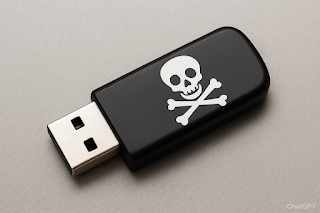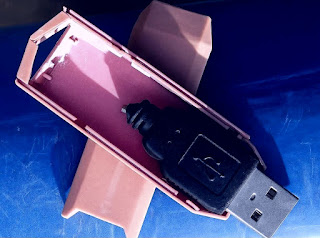
⚠️ Warning: The Rise of Fake USB Flash Drives and Data Scams
Recently, new methods of scamming people through technology products have emerged, particularly targeting users of USB Flash Drives. You might see an attractive-looking flash drive with an enticingly low price, but it’s often a mere deception.
Upon inspection, these fake drives often lack the genuine electronic components of a real flash drive. In the most severe cases, they might simply be a USB charger head connected to an empty plastic shell, meaning they have zero data storage capability. Scammers often use a simple modification to the device’s firmware to deceive buyers.

? The Fake Flash Drive Deception
- Visual Deception: The product looks like a normal, high-capacity flash drive but is often an empty casing with a USB plug attached.
- Capacity Trick: Initially, the device’s firmware is manipulated to display a large capacity, such as 1TB or 512GB, when the actual, usable capacity is either tiny or non-existent.
- The Lure: Scammers exploit the allure of a very low, symbolic price for a large storage capacity (e.g., claiming 1TB or 2TB), successfully deceiving tech users.
- The Big Trap (File Transfer): When you initially transfer files to the fake drive, the process appears normal. However, the shock comes after the transfer: 90% of the files will be empty, corrupt, or unusable.
- The Major Danger: Beyond losing unimportant data, these scams risk the loss of crucial information like work files and personal memories. Even worse, the fraudulent drive could potentially be a vector for transferring viruses or compromising your device.
? How to Identify a Genuine Flash Drive from a Fake
Here are essential steps to avoid falling victim to this scam:
1. Purchase Wisdom
- Avoid Unknown Sellers: Do not buy flash drives from unknown vendors, especially in public transport or on the street, or any flash drive priced too cheap to be true.
- Buy from Reputable Sources: It is best to purchase from well-known brands like SanDisk, Kingston, or Samsung, or from established, trusted technology stores.
2. Verification Tests
- Large File Test: Try transferring a large video file (e.g., one exceeding 32GB) to the drive. After the transfer, attempt to open the files. You will likely discover that most files are corrupted or the folders are empty.
- Software Verification: Test the flash drive using reliable software like H2testw. This program can verify the true, actual capacity of the drive, helping you confirm its legitimacy.
3. Market Awareness
- Know the Average Price: Research the average market price for flash drives of different capacities from legitimate companies. If you find a drive with the same capacity at a ridiculously low price, consider it a major warning sign.
? Golden Advice Before Buying Flash Drives
- Prioritize Safety for Critical Data: If you have important or critical data, use a genuine SSD (Solid State Drive) or cloud storage solutions instead of risking file loss on flash drives.
- Avoid Cheap Drives for Sensitive Data: Do not rely on cheap flash drives for sensitive data storage, as the average lifespan of cheap, generic flash drives is generally short.
The take-home lesson: You must be smarter than the fraudsters. Not every cheap item is a gain; often, it’s a trap, especially now that these scams are widespread.
